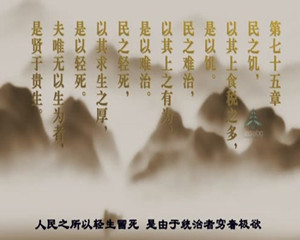此章经旨,是言在上者治世不善,而导致了民之难治。为君者食民税太多,致使民饥饿;在上者贪求荣华享受,下民仿效而皆求厚生,反而误入了轻生死地。这是治世者造成的恶果。本章是承上章"民不畏死,奈何以死惧之”而申言之。民之所以愚昧,治之所以为难,其责在上不在下。圣人治世,无事而民自富,无欲而民自朴,无为而民自化,好静而民自立,故而绝无"税多民饥”、"有为难治”、"厚生轻死”之类事。在上者为政清廉,以德自守,不以多事扰民;在下者就会以德化心,清静无欲,乐于其生。此便是"贤于贵生”之义。在上者若厚其生,下民皆效而仿之。为了厚生,便轻举妄动,乃至触犯刑律,轻弃其生。太上因当时世俗之弊,故而提出"贤于贵生”的期盼。这对当今社会,其意义尤为深远。

《道德经》(第七十五章)
民之饥,
以其上食税之多,
是以饥。
民之难治,
以其上之有为,
是以难治。
民之轻死,
以其上求生之厚,
是以轻死。
夫唯无以生为者,
是贤于贵生。
Chapter 75(Victor H. Mair 译)
Human hunger is the result of overtaxation.
For this reason,
There is hunger.
The common people are not governable because of their superiors' actions.
For this reason,
They are not governable.
The people make light of death because of too much emphasis on the quest for life.
For this reason,
They make light of death.
Now,
Only she who acts not for the sake of life
Is wiser than those who value life highly.
Chapter 75(Stephen Addiss & Stanley Lombardo 译)
People are hungry.
When rulers tax grain,
People are hungry.
People are rebellious.
When rulers are active,
People are rebellious.
People ignore death.
When searching only for life's bounty,
People ignore death.
Only those who do not strive after life
Truly respect life.
Chapter 75(王柯平 译)
The people suffer from famine
Because the ruler levies too much tax-grain.
Thus they suffer from famine.
The people are difficult to rule
Because the ruler too often takes action.
Thus they are difficult to rule.
The people take life lightly
Because the ruler longs for life so avidly.
Thus they take life lightly.
更多精品翻译素材,敬请关注可可英语。












